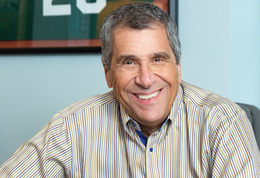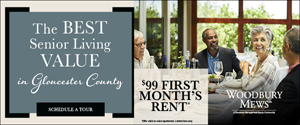
It’s mid-afternoon on a Thursday in November and Angelo Cataldi finds himself behind the wheel of his car, navigating his way from his home in Philadelphia’s Chestnut Hill neighborhood to Atlantic City, where he’ll be live on the airwaves broadcasting from the Borgata the following morning at 6 a.m.
For the man who has hosted 94WIP’s juggernaut of a morning show for more than three decades, it’s a drive he’s made countless times before. But soon, these weekly treks will be coming to an end. Because in just a few short months, Cataldi will be stepping away from the microphone and retiring from his storied radio career.
Loyal listeners have heard this song and dance before as the legendary sports talker has made several references in prior years about retiring—sometimes as veiled threats while in the midst of ongoing contract negotiations with the station—but this time he’s dead serious. And speaking while dodging traffic on his way to A.C., you can hear it in his voice.
“I’m tired and I’m ready to do it. This has been a long run and I’m really burned out,” the 71-year-old says. “I really wrestled with it for the last five or six years, I wasn’t sure what to do. I was looking for a sign from above to let me know when it was a good time. And this is a good time, I have no regrets whatsoever. I loved doing it, but it’s hard; harder than ever.”
Cataldi knows the end is near, he just doesn’t know exactly when that’ll be as he’s pledged to stay on the air for as long as the Philadelphia Eagles’ magical season continues. In the meantime, he’s hosting the morning show four days out of the week—part of his negotiations with the station last year included his request to have Wednesdays off—offering his signature rants, playful banter with co-hosts Al Morganti and Rhea Hughes, and entertaining interaction with callers.
On the air, Cataldi can be loud, boisterous, jovial and at times combative. And the listeners eat it up. The show has consistently been a ratings monster and helped propel Cataldi as the longtime voice of the Philadelphia sports fan. It’s a badge of honor for the Rhode Island native who originally came to the city in 1983 to work for the Philadelphia Inquirer before eventually leaving print media behind a handful of years later when sports talk radio was in its infancy stages. Frustrated by the bureaucracy at the newspaper, Cataldi fully admits he took the radio gig because it paid him $20,000 more a year. Having no experience in radio, he figured it was a quick money grab and that he’d be looking for work in a couple of years when his partner and mentor Tom Brookshier’s contract expired.
Then those two years turned into three decades, and along the way Cataldi has established himself not only as the preeminent sports radio host in Philadelphia, but as someone who is recognized nationally for his contributions to the industry. And it’s the unexpected journey that makes him even more appreciative of his career and what he’s been able to accomplish.
“Nobody goes into radio thinking they are going to do 33 years on one radio station at one day part. I got really lucky being in the right city with a loyal fan base that kept me in the business a lot longer than I could’ve ever imagined,” he says.
During the course of our conversation, Cataldi reflected on the memorable moments that have stood out during his longstanding career and the legacy he’ll leave behind. We also talked about what he missed most about South Jersey since moving out of Medford a couple years ago and found out how he plans to spend his days once no longer on the radio. While’s he’s certainly ready to ride off into the sunset, he still has a little more to give.
And if you know anything about the man, one shouldn’t expect him to go quietly.
When you made the transition from the newspaper business to radio, could you ever have envisioned having a run this great?
Pete, I honestly thought I was going to do two years. That was the length of my contract and that was also the length of Tom Brookshier’s contract. I was under the impression he was ready to wrap it up and I was just kind of a transition guy because I really had no experience in radio. By the middle of the second year, [Brookshier] was making it sound like he was going to leave and [the station execs] were saying they wanted me to keep going with it.
Honestly, there wasn’t any point in all these 30-some years that I didn’t’ think my number would come up.
Was there a moment when it all clicked for you and you realized radio was what you were meant to be doing?
I can say maybe eight or 10 years in, I realized it was the right call. While I was doing pretty well in radio, newspapers were hitting a bad spot and they weren’t doing so well. A lot of people I worked with [at the Inquirer], they were getting bought out and the company started cutting staff. And none of what I did was planned. I didn’t anticipate newspapers would struggle the way they have. I just did it because I wasn’t sure what I wanted to do next. I was sure I wanted to leave the Inquirer. I wasn’t happy there anymore, and I was looking for an opportunity to do something different, even if it was for a short period of time.
And I took this job because they offered me $20,000 more than I was making at the newspaper. I did it totally for the money. It was a temporary move. I said, “Wow, I’m going to make more money, I’ll do it.” I had no idea what I was getting into, I knew nothing. But what the heck, I’m not going to have to deal with the editors and the lawyers I was dealing with when I was writing stuff for the Inquirer. I wanted a break from that.
It worked out OK, I was really lucky every step of the way.
You have flirted on air with the idea of retiring before, so what made you decide that now was the time?
Four years ago when the Eagles were on their run, I was thinking what a great way it would be to end things if they were to win the Super Bowl. But no one thought they were going to win it. I might’ve just cashed it right then if I thought they were going to beat the [New England] Patriots. But when they did, it was too late. The parade was going on, there was all this hoopla in the city. I thought, well I can’t do that, I don’t want to leave the station stranded since I didn’t tell them beforehand. So I’m going to have to stay for a while.
Then I made a firm decision at the end of last year, I was positive I was doing it. It was this time a year ago and I was expecting to leave when the station came to me and said, “We really need you do one more year. We have a new program director coming in and we want to give him time to get himself comfortable.” I said, “I don’t know, I don’t think I can do it.” They said, “What will it take?” That’s when I came up with the four-day work weeks and Wednesdays off and a whole bunch of other stuff they hooked me up with. And they agreed to it, so I said, “Alright, I’ll try to do another year.” But I knew a year ago I was right near the end.
I came back and I’m glad I did, because I got to experience this run that the Phillies had. And right now I’m going to end it whenever the Eagles do. I think I would feel awful if I was on the sidelines and this great season was going on. So it’s a good way to go and this is the right time and the right place and I’m happy to do it now.
When you hear the reactions from listeners or those you encounter out and about, I have to imagine that is a little embarrassing for you, but also extremely rewarding.
It’s weird because I love that they feel that way, it’s incredibly flattering. But it’s really the other way around. They hung with me and gave me this really great job. I honestly mean that. I have been an advocate for the fans from the first day because the only people I have to please are the fans. I’ve never given a damn about the owners of the teams, or the players on the teams or the coaches or the mangers. None of those people. I don’t want to befriend them, I don’t need to have a relationship with them. I am not trying to wish that someday I had been them.
All I tried to do is bond with the fans because the fans are the ones paying my bills. The fans are the ones that need to listen every day, if they feel motivated to, and they did. So when they are thanking me—I answer a ton of emails and I always thank them. I say you don’t understand, the debt is mine to you because you guys kept me doing this. All you had to do is turn the dial. The minute the ratings go down, they let you go. That’s the way that works. It’s radio, it’s a business.
But they kept turning the dial on and kept listening to the point that I was still getting good enough numbers to stay on and work. So my debt is to them, not them to me. All I did was come in, have a terrific job that I get paid very well for. That was a better deal for me than it is any listener.
Do you ever think about your legacy at all? From the folks who have worked under you, to those who work alongside you, your fingerprints are all over those who cover Philadelphia sports. Do you ever reflect on what you’ve meant to not only the fans, but your colleagues?
It’s a great thing. I’ll turn on NFL Network and my [former] intern Colleen Wolfe is on there. Or I turn on KYW Radio and I can listen to David Uram, who was an intern for us. Zach Gelb is a big national talk show star who was with us. Kyle Neubeck writes for the Philly Voice and covers the Sixers brilliantly, and he’s part of our legacy.
I feel unbelievable pride in that because that’s the generation we spawned. Those are the people who worked with us, and maybe picked something up along the way. Hopefully they discarded some of the stuff they shouldn’t have picked up, because not all of it was good information.
It’s so great when I hear one of them. I’ll tell you, I’m at a point now because it’s been so long, I’m trying to remember what they were like as interns because we’ve had an awful lot of them. Some of them, they barely register with me, but I see what these folks are doing and I go, wow, he’s already passed me, she’s already passed me. Good, I’m glad. I always felt like there was a teaching element to it. When we had interns, we took it seriously and we tried to show them, at the very least, the price you have to pay to do the job well and the amount of work you have to put in. And enough of them picked it up that they had success and that’s an awesome thing. I’m really happy about that.
It was recently announced that fellow WIP hosts Joe DeCamara and Jon Ritchie will be taking over the morning show upon your departure. How do you think they will perform in the new role?
I totally endorsed the decision, although I had absolutely no say in it whatsoever. Nor did I want any. Listen, one thing I know is that I would have been an awful management person myself, I would have not been able to do that job. I’m too emotional, I’m too loud; those are the things that helped me on the air, but would be bad if I was a boss.
Joe is different, obviously he’s much younger, has different opinions. But he’s quirky and I think that’s important. I think it’s important that you not be too mainstream, because if you’re predictable and thinking what the fans are always thinking, it’s going to get monotonous. People want to hear different slants on what’s going on and a little pushback is good.
And Jon Ritchie is brilliant. He’s one of the smartest people I’ve met and he’s a great counterbalance to what Joe is doing.
And then you add Rhea, who is really the brains of our operation now and has been for a few years. She is a brilliant planner and so smart about what works and what doesn’t on radio.
And you got our producer, Joe Weachter, with them. Joe is the best radio producer I’ve ever seen, he knows every element of the job. And then you have Joe and Jon’s producer James Seltzer, who is also a really smart radio guy. So, that’s five people to do everything we did and maybe more.
You have to understand, I’m going to be 72 years old. Our demographic is people between the ages of 25-54, so basically I’ve been out of our own age demographic for 18 years [laughs]. I remember when I turned 55, it was tick, tick, tick. How much longer before I’m not speaking their language? Well, the guys who are going to be taking over are right in the middle of that, so I have to assume they are going to speak more toward the audience that are most significant to our ratings. More than I ever did or than I have for over a generation now. So I think it’s probably going to be an opportunity to take a younger, more hip approach to this stuff we’ve been doing.
I can’t reference Frank Sinatra—who is left that remembers him [laughs]? It’s really hard to put away all your references from when I started at 38. Now, I have to keep working at it to reference people who are more of today. It’s harder and harder the older you get, is all I can tell you. I think Joe’s going to update what we are doing and make it more current.
You mentioned that Joe is “quirky.” I imagine having a personality like his is especially important when you’re talking about being on the radio in the morning.
Totally, totally, totally. Just knowing the facts, just doing the job, it’s not going to get it done. You’re not going to be able to entertain people. You’re going to be able to inform them, and that’s good, but not in the morning. You have to do more than that in the morning or you are going to get eaten up by a lot of other morning shows that provide entertainment and humor. You have to have some of that too. And Joe’s got it, and so does Jon and so does James and I think it’s going to go very well. It’s going to be a very smooth transition, I really believe that.
Let’s talk about life after radio. I know you are part of a television podcast with Rhea and comedian Jay Black. Have you thought about anything else or are you just looking forward to kicking your feet up and spending some more time down in Sea Isle and relaxing?
The podcast, I am just a weekly contributor in that I love television and to talk about it. It’s not my podcast, I’m just happy to contribute.
But, I know what I’ll be doing for the next year: I’m going to write a memoir. Whether or not it ever gets published or anything happens to it, I don’t know. I was a writer a long time ago and I’m going to get back into that game. And I’m going to talk about what life was like with the most passionate, crazed sports fans for over three decades. There’s a lot to tell and I want tell that story.
That’s my commitment when I get done. To organize and try to remember stuff, talk to people that will have better memories than me and try to put something together.
You’ve had this routine for so many years of going to bed when most people are eating dinner and waking up in the middle of the night to head to the station and prep for the day’s upcoming show. So, what do you think your days will look like moving forward?
My plan is to completely change my internal alarm clock. I told Joe DeCamara that I’ll be happy to listen to his show, but make sure the last half hour is really good because I’m going to be tuning in around 9:30 [laughs].
In my world, I’m going to stay up until midnight or so and then I’ll get up around 8 or 9 in the morning and I’m going to lollygag around for a while. And probably after a month of that, I’ll be sick of it, I don’t know. It’s all a new world for me. But I just know that getting up in the morning and not saying to yourself, “Get going, you’ve got to perform for four hours. Get going on it and start prepping the next show.” That’s hard and I’ve done it a long time and I’m really looking forward to not doing it next year. That’s the No. 1 thing, not having that mountain to climb every morning.
I know you moved out of South Jersey a couple years back. Is there anything you miss about Medford?
A lot. I miss the woods. I miss the deer in my backyard. It was beautiful, we loved it there. I only moved for one reason: my grandkids. I knew that my wife was going to be a big part of their lives and we had to be living a lot closer to them than we did. So we pulled up stakes from Medford; we were there for 13 years. Our memories of our time in New Jersey are terrific, it’s a wonderful place to live and if my grandkids moved to Jersey, I’d move with them again. We are just trying to stay close to the family, but it was a great run there. I loved being in Medford, I had great memories.
There’s been so many memorable moments during your time at WIP, maybe good and bad for you. But are there any that particularly stand out that you cherish?
We always knew how we felt would be tied directly to how the teams did. So right away my two best memories are the 2017 Eagles run. The Super Bowl, the parade, that’s my No. 1 highlight because it was the realization of a dream. I was a long way into my career with no chance for the Eagles to win a Super Bowl, only playing in one the whole time I was [at the station] in 2005. But when they won it, I said I can die happy because I’ve seen it. I wanted to be part of that.
And in 2008, when the Phillies won it, that was spectacular. Those will always be my two best.
Then getting to meet my childhood idol and interview him in the very early years when Wilt Chamberlain came on our show. That’s a memory I’ll cherish.
And I’d be a hypocrite if I didn’t mention that we had this event called Wing Bowl which ran for 26 years and sold out 20,000 tickets for a lot of those years. I realized that it ended controversially and it was really politically incorrect at that point, but I have to acknowledge it was a major part of what we did in the time we were in Philadelphia.
Speaking of that, you’ve mentioned that you couldn’t get away with some of the stuff that you did early on in your career. Having to walk on eggshells and be fearful of what you might say is not something I imagine you are wired for, so was that a factor in your decision to retire as well?
You are 100% right. If somebody on Earth had a tape from the first five or 10 years that we did the show, we were so different than we are now because it was a different world. But I’ve seen so many people get canceled for something they said many, many years ago, and so they could still fire us. It was a different world then and it was a more forgiving word, a more open world.
Our humor, some of it was more ethnic, some of it was more scatological; there were a lot fewer rules than there are now. And the direction we’ve gone is the right direction, it is. A lot of that stuff that we were doing, we didn’t take into account the people who were being hurt by it. We might have been entertaining some of the audience, but we were also offending people.
I’m happy with the direction, the only problem is having grown up in that more liberal setting, it’s hard to know where the lines are. Even now, we’ll get into areas and I start tiptoeing near the line because I don’t know where it is. You still have to be spontaneous, not a shock jock, but you have to say things that jar people a little bit. But you have to watch what you say because the next word out of your mouth may be your last one on the air. It was not that way when I started 33 years ago. That’s the change in the way the world is and you have to constantly adjust to it.
I think one thing fans would like to know is that after you officially retire, will they ever hear from you again? Will you ever call into WIP, pop up somewhere on TV, etc.?
Maybe after not being in front of a microphone for a month I’ll be screaming to have my voice heard. But right now I don’t plan on doing anything, with the exception of if and when I finish the book and it’s published and available, I will go back to relive a little bit of it and do a book tour.
I don’t think my voice should be heard all that much once I’m done. I want to do what Ray Didinger has done, he said goodbye and he meant it. When I say goodbye, I’m going to mean it. And when this book comes out, I’ll want to talk about it one last time and that will probably be my final bow.
At least that’s the way I look at it right now.











